How to discover one's Irish roots while learning not to accept mystery pills from long-lost relatives.
As a shitty bonus, cancer's long killing march through my family.
If you believe in the importance of free speech, subscribe to support uncensored, fearless writing—the more people who pay, the more time I can devote to this. Free speech matters. I am a university professor suspended because of a free speech issue, so I am not speaking from the bleachers. The button below takes you to that story if you like.
Please subscribe and get at least three pieces /essays per week with open comments. It’s $5 per month and less than $USD 4. I know everyone says hey, it’s just a cup of coffee (with me, not per day but just one per month), but if you’re like me, you go, “Hey, I only want so many cups of coffee!” I get it. I don’t subscribe to many here because I can’t afford it.
But I only ask that when you choose your coffee, please choose mine. Cheers.
___________________________________
Generally, diarrhoea is not a good conversation starter.
But it is involved in my trip to County Donegal and the village of Kerrykeel, where I discovered my Irish roots, met distant relatives, and chased the romantic dream I called Ireland. But the itch for Ireland started years earlier, with stories from my Grandmother and how our family was fed up with being crapped on by the English and, where about half the family in 1904 said enough and set off for Canada.
When I was 19, I worked on a farm in Altkirch, France, near Strasbourg. Much of my labours involved riding around the French countryside, dropping off bags of milk and making sure that the ones with flies in them were redirected for home consumption.
Life at home in Winnipeg wasn’t going well, so I escaped to Europe for a volunteer year. I started university at 17, thoroughly unprepared, and enrolled in a difficult pre-veterinary program, which did not go well.
Home life in our two-story turquoise house in Fort Garry, a Winnipeg suburb, was trying at times; my brother and I were often left on our own; my sister, three years older, had long departed, and my mother had been diagnosed with terminal cancer when I was 15, so she was back and forth to the hospital and her imminent death hung over the family like a dear friend whose rank breath was a two foot keep away. Still, nobody had the heart to buy him Listerine.
So my mother was busy attending to her terminal cancer and cheerfully buying wigs because the chemo left her without hair.
I still remember sitting in Mr. Albertson’s chemistry class after my parents gave me the cancer news. So that day wasn’t the time for lighting bunsen burners or laughing at Mr Albertson’s racist comments to two poor Chinese exchange students who still had the balls to sit in the front row in my chemistry class at Vincent Massey. It was about 1980, and racism had not yet earned its ugly reputation, nothing like today, where the fear of being called racist is at the foundation of much of our government policy.
]
My mother was going to die; there would be no parents plural; my dad was not the remarrying type, my shoulders dipped; die, motherless child, no more tomato soup lunches in our tiny kitchen, sitting at the table with Misty, our Westie tapping on my leg to get a cracker. The weight of the pre-grief pushed my shoulders forward; I feigned a lash in my eye.
They said mum could last years; there seemed to be still a tiny seat in the corner for hope, and my mother didn’t seem down about it.
My parents weren’t fully up front; for some years later, in the hospital, my brother Doug and I had a nurse come to us as we sat outside our mother’s palliative ward.
“She might live six more months,” the nurse said excitedly, saying it as if she had just told us that we had enough gas to make it to Emerson and back and didn’t need to hit up the local Domo with $.4.37 we had found scrounging through seat cushions and countertops.
It was 1986, that’s just about 40 years ago, and my twin and I staggered, punch-drunk in horror and shock; we understood palliative but still hoped for miracle cures; we advanced on two plastic chairs down the hallway, stacked beneath a large window overlooking the St. Boniface Hospital Parking lot. I just remember the yellowed tiles in the hallway and the powerful compulsion to escape her room.
Memory is curious. It is not like a recorder; it is pictures wrapped in triggers—smells, images, words and the occasional melody.
Our family ran our schedule off Mum’s chemotherapy treatments; when she finished one, she and Dad would be off to our farm near Vulcan, AB, and my brother and I would fill the house with our friends, mostly males.
Drinking was drinking to drink; I remember calculating the cheapest form of alcohol: it was cooking sherry or Club beer that was 7% and was utter piss, but drunkenness was not the by-product. It was the goal.
The poor neighbours, looking out the window at one am and seeing the Finlayson boys and friends kicking a ball around with their things hanging out and peeing on the ball when it came near, was called “Pee Ball,” and I am told I played it.
But in those days, neighbours didn’t call the police. They just rolled their eyes, comforted by the fact that those drunken idiots would not play Peeball forever.
But mum was still optimistic; there was always talk about “fighting,” but you can’t fight cancer; it was bullshit; even at that age, I knew it was a cruel, cellular evil we would never see or touch but just see its effects.
You don’t fight a terminal disease rampaging through your cells; you comply, and she did the hormone treatment, radiation, and chemotherapy (see the article posted). My dad spent nights sleeping on a thin blue yoga mat on the tile floor.
Dad was not a man of words and tears, but even as cancer moved into her brain, he had so little to give, and he gave her the awareness of a fierce devotion; in a fight with cancer, it was like a small child punching a giant with wild fists, but he was by her side, present at least.
And 38 years later, as my dad’s cancer left him gauping - why did I keep that on my phone - I can barely pull my mother’s image into my mind’s eye, just a few scattered impressions; I remember her and dad bursting with pride when I won the Provincial Gold Science Medal in grade five.
My last words on the phone to Dad, my brother, bless him, who had set up a Facebook chat, were, “I’m coming for you, Dad. I love you." By the time I arrived, Dad could not speak, but he knew I was there, and within hours, he was gone; he had waited for me, too. I was convinced that Prairie Boy's grit kept him alive until his son was at his side.
Silently just being together was a Finlayson family tradition, a bookish family, just present, reading in the same room. So much of the time with me, Dad and I were just reading alone, but in the same room, he was on the floral patterned couch, his feet wrapped up in the afghan my mother knit - that is now beside me - while I sat on the orange velour rocker.
Dad’s presence comforted me. Perhaps this explains my fierce love for my dogs, both Westies - Toby and Malibu.
Today, in 2024, as I sit on the basement leather couch, the dogs sleep on each side of me, the same 70-year-old blue, white and red afghan my dad treasured is under Malibu’s chin.
I offered no invitations to my pups, but they always are there.
They simply want to be near me because I am me. I am not feeding, playing or stroking them; they want my presence. They are mute, loyal creatures, inches away, sometimes Malibu dreams, woofing at some squirrel that in her dream I hope she catches. But presence and raw time together are underrated, and Dad - I made it back for you. I apologise for reading the sports page as you spent your last hours on this earthd but thank God my plane got me back on time, and I was there.
Perhaps it comes from the Oprahfication of our society, but the idea that you can “fight” off a terminal disease with the power of your positive thoughts is nonsense. Complying with medical direction and not curling up into a ball and screaming I am going to die is admirable, but I’m not sure if that is called fighting.
But my mum got into positive thinking, fighting cancer with a positive attitude, and I think the concept that there was any efficacy to such nonsense caused more harm than good. It implicitly becomes a game of victim blaming. If you are dying, you weren’t positive enough. You didn’t manifest enough or missed episode #442 of Oprah.
No, you can’t will your way through cancer; the will to comply with medical advice and keep one’s life and relationships together is enough, but a burden of the expectation that if I hold enough delusionary optimism, it will release chemicals that conquer the cancer is bunk.
My dad was not an emotional man but stubbornly devoted to his wife. He slept on a yoga mat at the foot of her bed for many months, coming home just to shower; those days have faded. She has been gone for almost 40 years.
Dad said that if she had gone to the doctor earlier, she could have lived 30 more years. My dad’s cancer was also missed.
Everything was COVID a few years ago. Our politicians developed a neurotic fetish over it; other health issues got pushed aside.
The issue with COVID was that it was viral, and the consensus was that doctors couldn’t do anything, so don’t see a doctor unless you are dying or believe you have died; my dad was raised in a yellow farmhouse that family lore said was made from pulling two old wooden grain bins pulled together. But Dad and his parents were always miles from doctors, and generally, going to them was not worthwhile.
The futility of COVID was that they couldn’t help you, so my dad stayed home, unaware that lymphoma was rampaging through him. In our wretched medical system that still feeds off an unearned moral superiority over the Americans, my father was diagnosed with constipation three weeks before he died of cancer; there even was blood work, but they still missed it altogether; he was stuck for a few days in a converted closet at the Victoria General Hospital, his doctor was a rude Indian lady who had all the bedside manner of a cornered badger and was dedicated to giving at least 12 seconds to each patient.
But my dad was there for my mother—six years from diagnosis to death.
Mum was in the hospital only for the worst of the chemo, and I don’t remember my thinking. In hindsight, it comes with no small measure of guilt, for as previously said, I had spent my nineteenth year in a volunteer program in Switzerland and France, feeding dairy cattle, pulling rank rain-filled old tyres off the plastic tarp that covered the piles of maise, the cattle feed and feeding the cows from an ancient cart with two wooden braces that let me lever up the cart and march from animal to animal.
I helped repair posts and shovelled grain; I was a manual labourer and wasn’t allowed near a tractor. Mum and Dad had even flown to visit me, even though she was ill. She collapsed one time in a restaurant, and my distraught dad looked at the waiter.
I hate French waiters. He said in bad English or French, I can’t recall, “Do you still want to keep her food?” Those compassionate French.
Hindsight lets you elevate your camera and get a drone-like view of the land. I know now that my volunteer year was just an opportunity for cheap Mennonite farmers to prepay for labour; I can’t believe they thought it was the dream of a Canadian professor’s boy escaping Winnipeg and a dying mother to work from 6 AM to 5 PM and have no friends.
But on the other side of the pond, the volunteer year was pitched as an adventure. I thought I might be an exotic treat for the Swiss and French girls, and that never happened; they barely made eye contact.
I made only a few friends with kids on the same volunteer program; even then, they lived miles away. And I don’t think a French or Swiss girl, other than my German tutor, became a relationship that went past eye contact.
It was the mid-80s, before the Internet. I lived for the mail, and one night, depressed after a week without a letter, I sat in my room and pounded a bottle of cheap French-made flavoured vodka.
Still, not being much of a flavoured vodka drinker, I ended up vomiting over half the room and then trying to explain it as a bad case of the flu when the evidence came out the next morning. I also felt tremendous guilt; I remember a slow, hungover, prayerful, regretful walk down a set of railroad lines near the original pillboxes of the French surrender monkey’s unsuccessful Maginot line.
When the year ended, I returned to Canada, moved to Minnesota for school, and never got better grades. There was no noble motivation; I was determined to avoid anything like my Euro labours. University would stop me from shovelling grain into a hopper for eight hours daily.
My mother died just after I turned 22; she had admirably hung on. I kept studying, went to grad school at the University of Minnesota and then returned to Canada to do an MBA at Schulich/York in Toronto.
But about 15 years later, I lost a job and travelled to London for some interviews, the real London, not the dimestore Canadian want-to-be. I lived with my brother and his wife; perhaps the English job market would be better for me.
But after a few interviews where I was told I didn’t have enough English experience, I was becoming exhausted with being looked down on as some simpleton from the colonies; I decided I was too close to Ireland not to take advantage of the chance to discover my Irish roots.
I was just another Canadian Prairie boy, about as Irish as a box of Lucky Charms. Still, I did have an Irish passport, and I was determined to find out where my grandmother had been born, though she had long departed from this mortal coil.
I had friends in Dublin who were kind enough to put me in their apartment. My dad gave me the contact information for these Irish relatives I’d never met, arrangements were made, I was invited, and soon, I was sitting on a public bus bound for Letterkenny, Donegal.
I arrived in the middle of the night and made a call; my uncle and aunt were lovely to this strange relative from Canada. They put me in a tidy room, no nodding at the couch. They toured me around the old farm; the home my grandmother had been born in was now an animal shed; the country was full of sheep, and that myth about sheep being dumb was reinforced. I saw more than one sheep caught in a fence where escape didn’t require Houdini skills; it just required the sheep to stop going forward and pull back.
But I’ve done the same thing a few times, so I shouldn’t look down at sheep.
Irish people are some of the friendliest people on the planet, and they weren’t all drunk—that was just a myth. I saw the church my grandmother attended over a hundred years ago. The family name was on the wall; they’d paid for a stained-glass window.
My new relatives shuttled me up and down the narrow farmer’s roads, regaling me with stories about the family. Despite the church plaque, they weren’t all saints.
I stayed a few days, and as I was about to step on my bus, my uncle gave me a pill. He said it was an elixir. I know that when my Irish ancestors came to Canada, many believed in fairies, fairies—look one over there—but I didn’t want to be rude, so I took it. I didn’t let the fairy racism question my faith in his elixir.
Uncle said it was aloe. I wish it were acid or a roofie; it couldn’t have made things worse.
As the bus rumbled toward Dublin, my stomach began to cramp. The bus was toilet-free, and the Irish must have had better bladder control because there were no pit stops.
I knew my body; when that large intestine started knotting, there were no false alarms; the pain rolled down the tracks, and nothing would stop it. In about fifteen minutes, the pain felt like my large intestine was trying to choke itself out.
By then, I was drenched in sweat, and every cell in my gut was howling in pain.
Again, it seemed the Irish don’t do bathroom breaks, but as a tourist, I knew shitting your pants on a bus was bad manners.
They talk about the ugly American, but I didn’t want to be the defecating Canadian.
I held out as long as I could, but finally, I staggered toward the driver and begged him to stop the bus; for some reason, I mentioned possible vomiting, as vomiting is much less embarrassing than involuntary defecation.
So, without going into all the scatological glory of the situation: a public washroom, my ass, the side of the road at dusk. I ran across the highway into some farmer's fields; there were no trees, just brush. But a large bush ran along the side of the field, perpendicular to the road. I could hide here and maintain some dignity, but I am sure everyone on the bus knew.
I wasn’t a botanist doing some random stop-the-bus—I needed to identify the bush. But the light was fading, and the bush was in a ditch, so I fell first into the bramble but got up and defecated with Gatling Gun ferocity.
And then I did the walk of shame to my seat; I can’t remember if some poor soul was sitting next to me. I looked out in the field where I had made my fertiliser donation. I was lucky to have found a few leaves for bumwipe, but to me, it seemed like there was no doubt that a full bus of Irish strangers had just seen a 35-year-old Canadian crap in a ditch.
Embarrassment is a strange beast; it sticks around even though I am safe in Canada. Years later, the embarrassment has faded, but I wonder if they had to replace the seat. I’ve seen some drunks puke on themselves and never had the pleasure, but unfortunately, even vomiting on one’s lap is less embarrassing than public shitting.
Much of the pain was gone on the bus, but old leaves do not make good bumwipe. In 20 minutes, what was the world’s most potent laxative cried out to my large bowel, “Let’s go for round two.”
But there is a complete, one-stop bus limit to shitting oneself in Ireland, a minor clause in the constitution, so well, yes, I had no choice, the pain was back in most of its previous glory, and it would not be delayed; the large bowel was like a landlord, and the eviction order was final and unrelenting.
So, while I pretended to read Pushkin, I shit myself. But the volume was way down, the bowel landlord was finally satisfied, and the sweat on my head began to dry. A kind lady said something about having the same problem. I did not believe her, but I did not argue.
But Dublin eventually arrived, and I’d never see these people again.
Thanks to my newfound uncle, they probably had to throw away that bus. I've never been back to Ireland, but I love Guinness.
A shower, a small washer load, and all was well with the world.
The next day, the company that was my last London-based hope said I didn’t get the job. But I soon learned about Immodium.
I wrote to thank my uncle and aunt for their hospitality but didn’t mention the elixir. And I returned to Canada.
Please subscribe and get at least three pieces /essays per week with open comments. It’s $5 per month and less than $USD 4. I know everyone says hey, it’s just a cup of coffee (with me, not per day but just one per month), but if you’re like me, you go, “Hey, I only want so many cups of coffee!” I get it. I don’t subscribe to many here because I can’t afford it.
But I only ask that when you choose your coffee, please choose mine. Cheers.
\






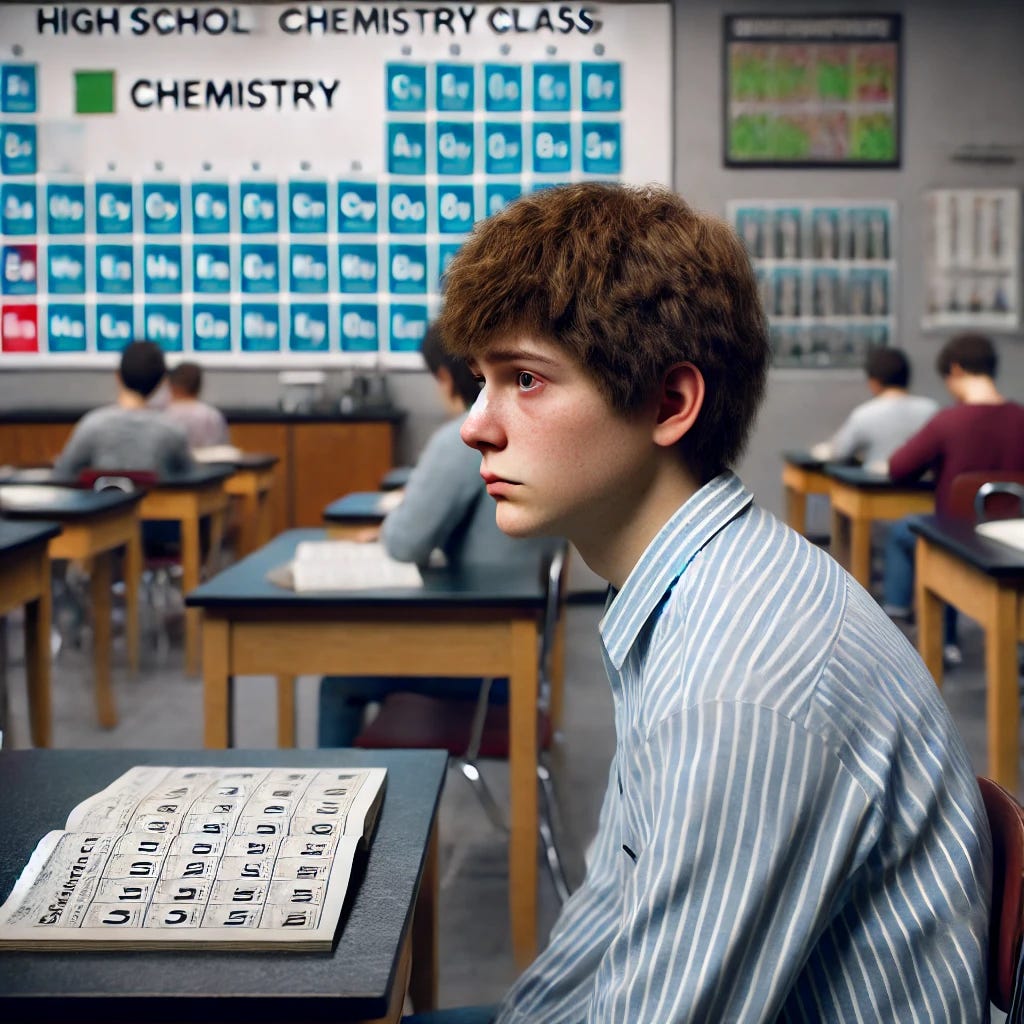
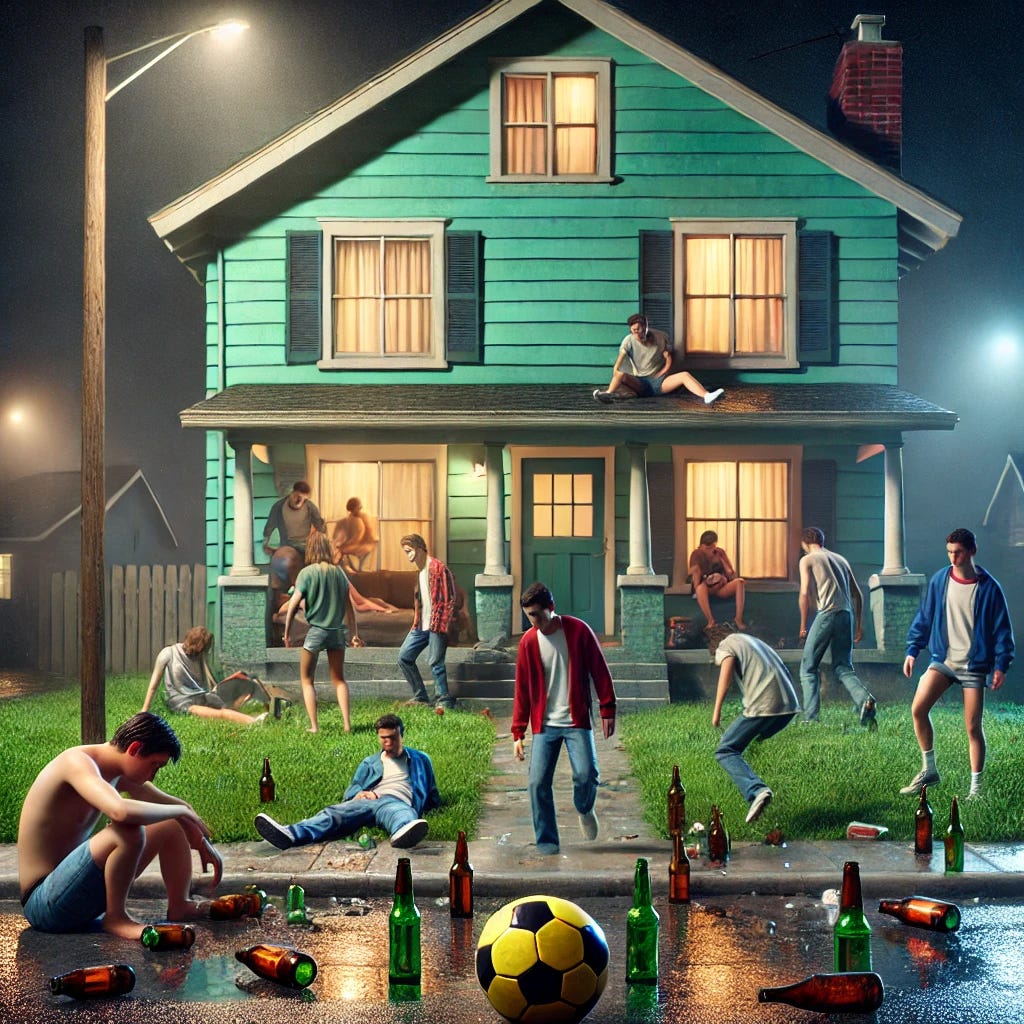
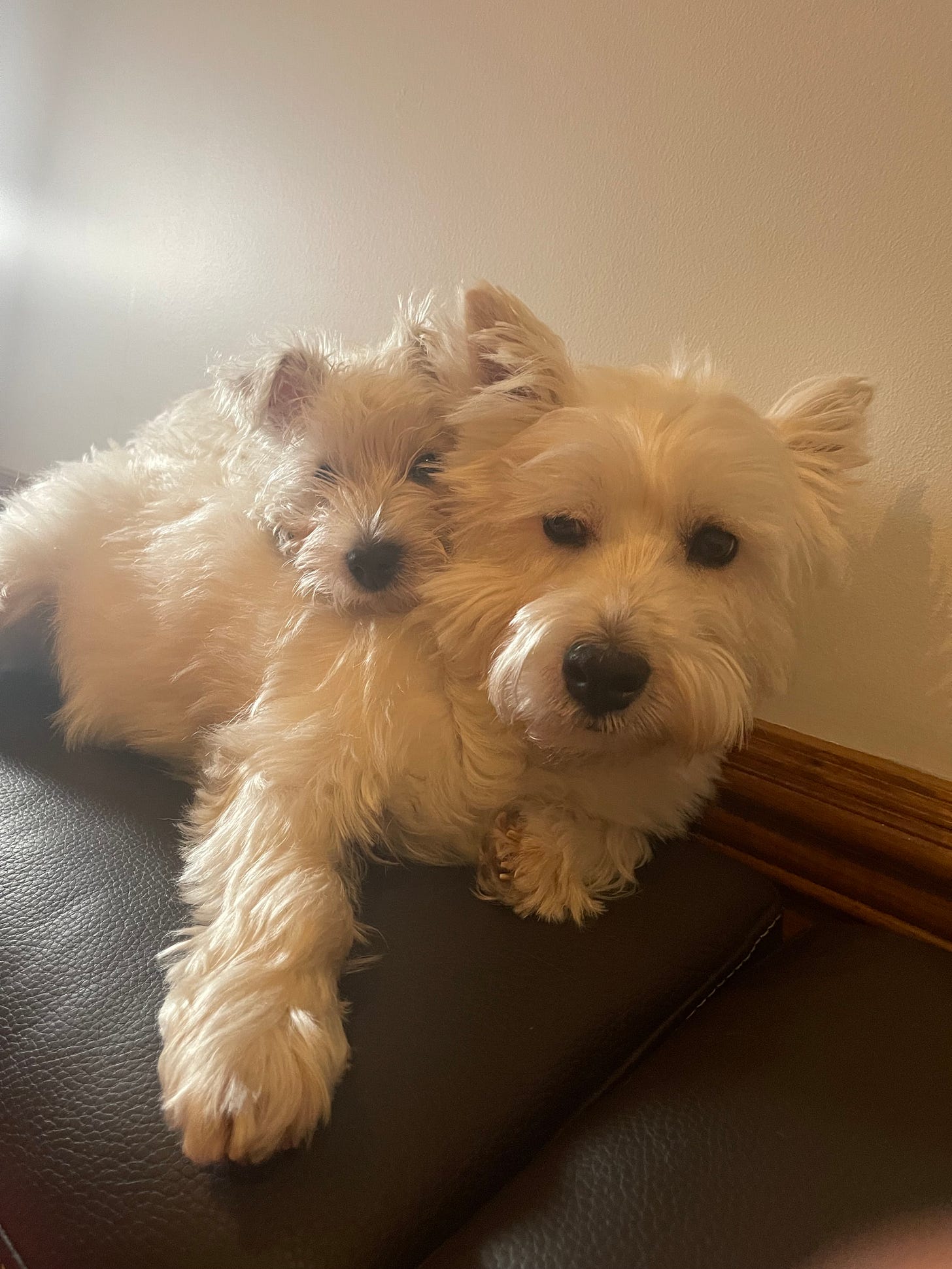
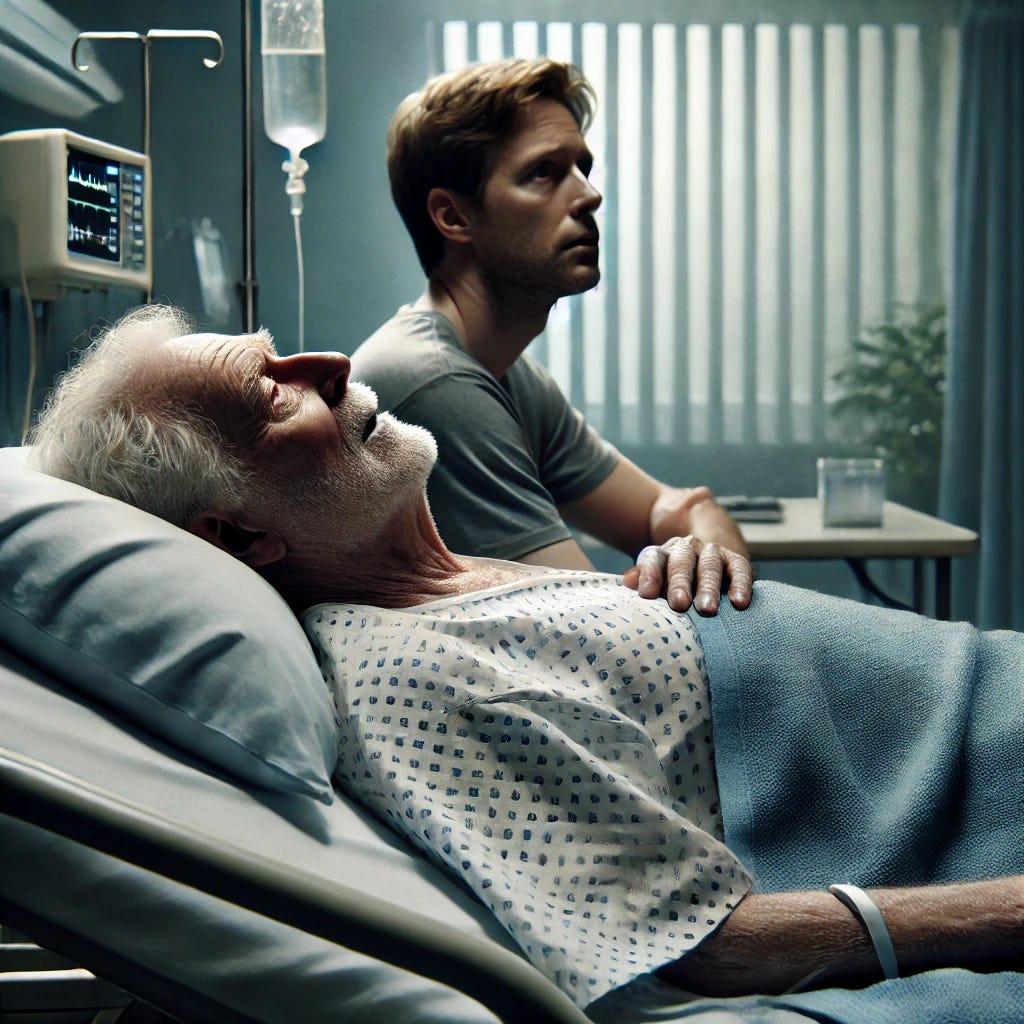
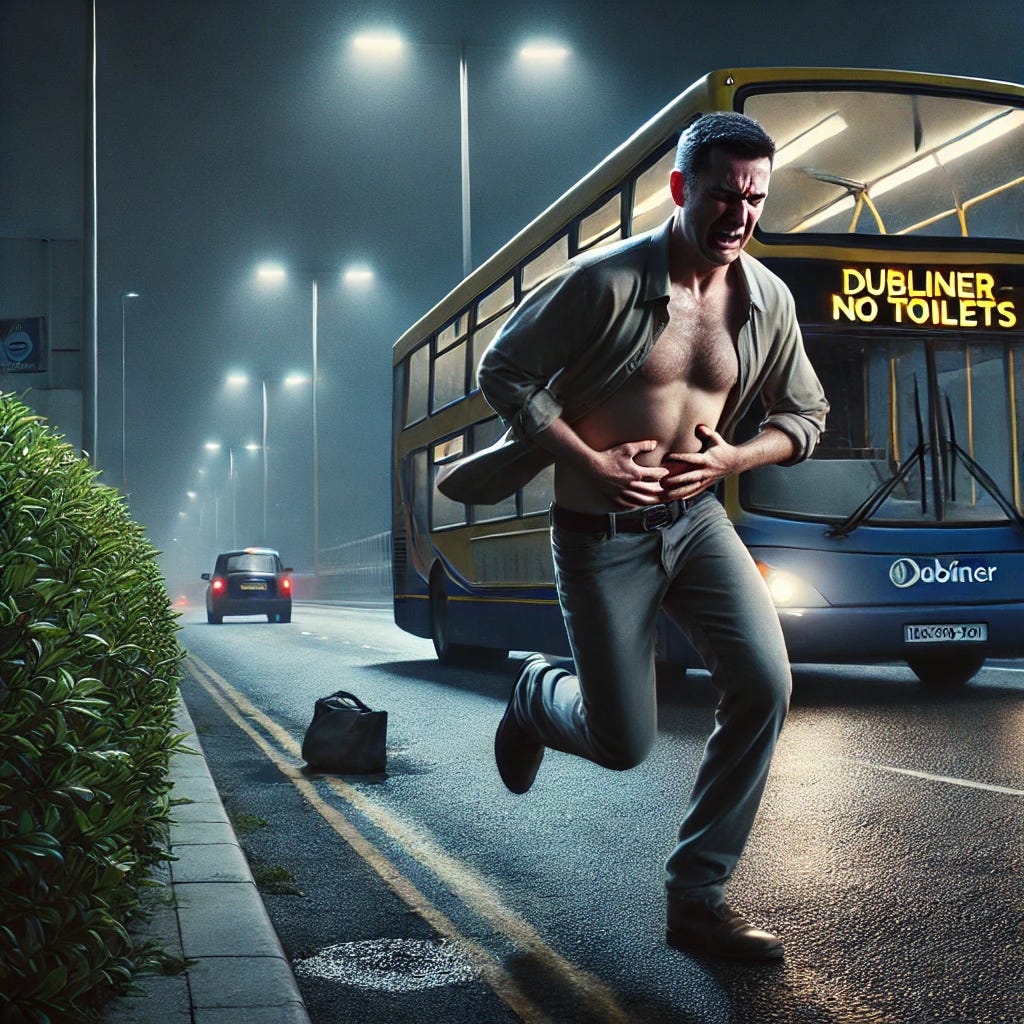
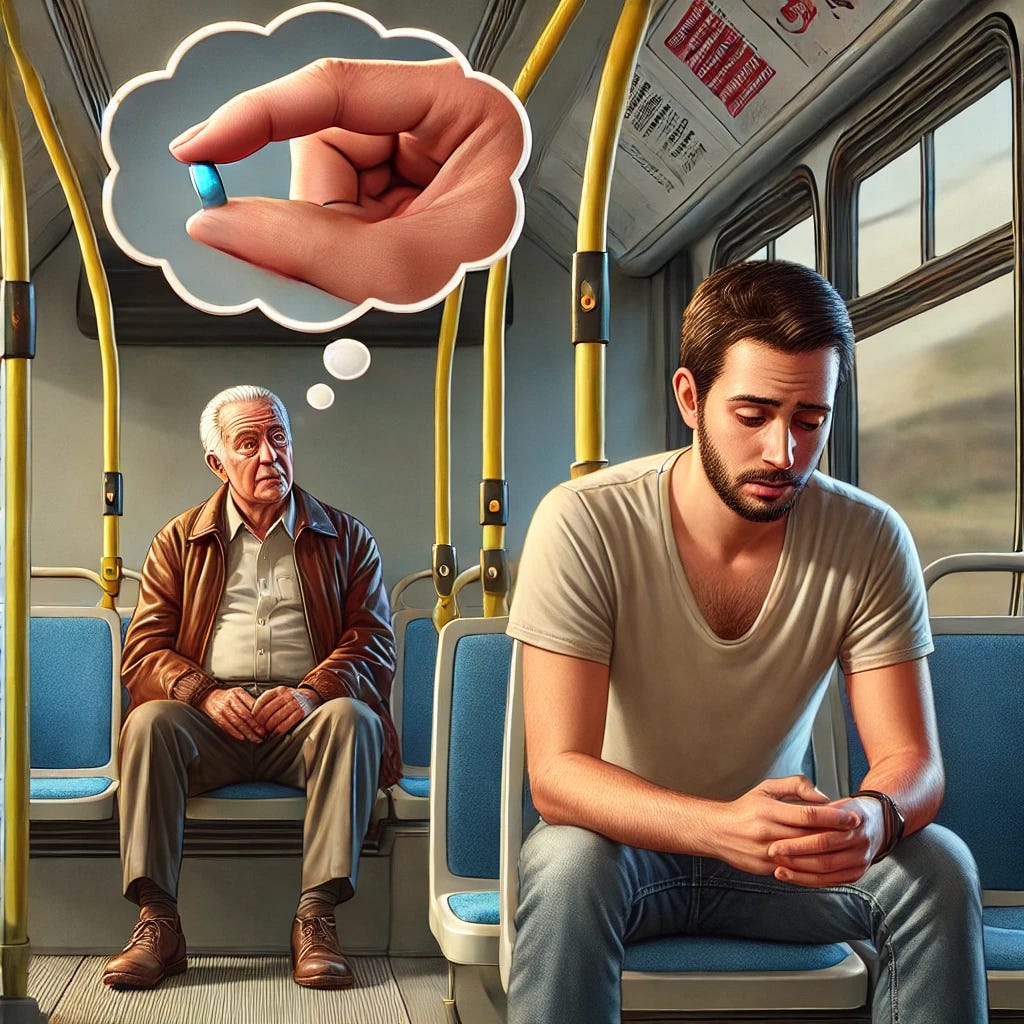
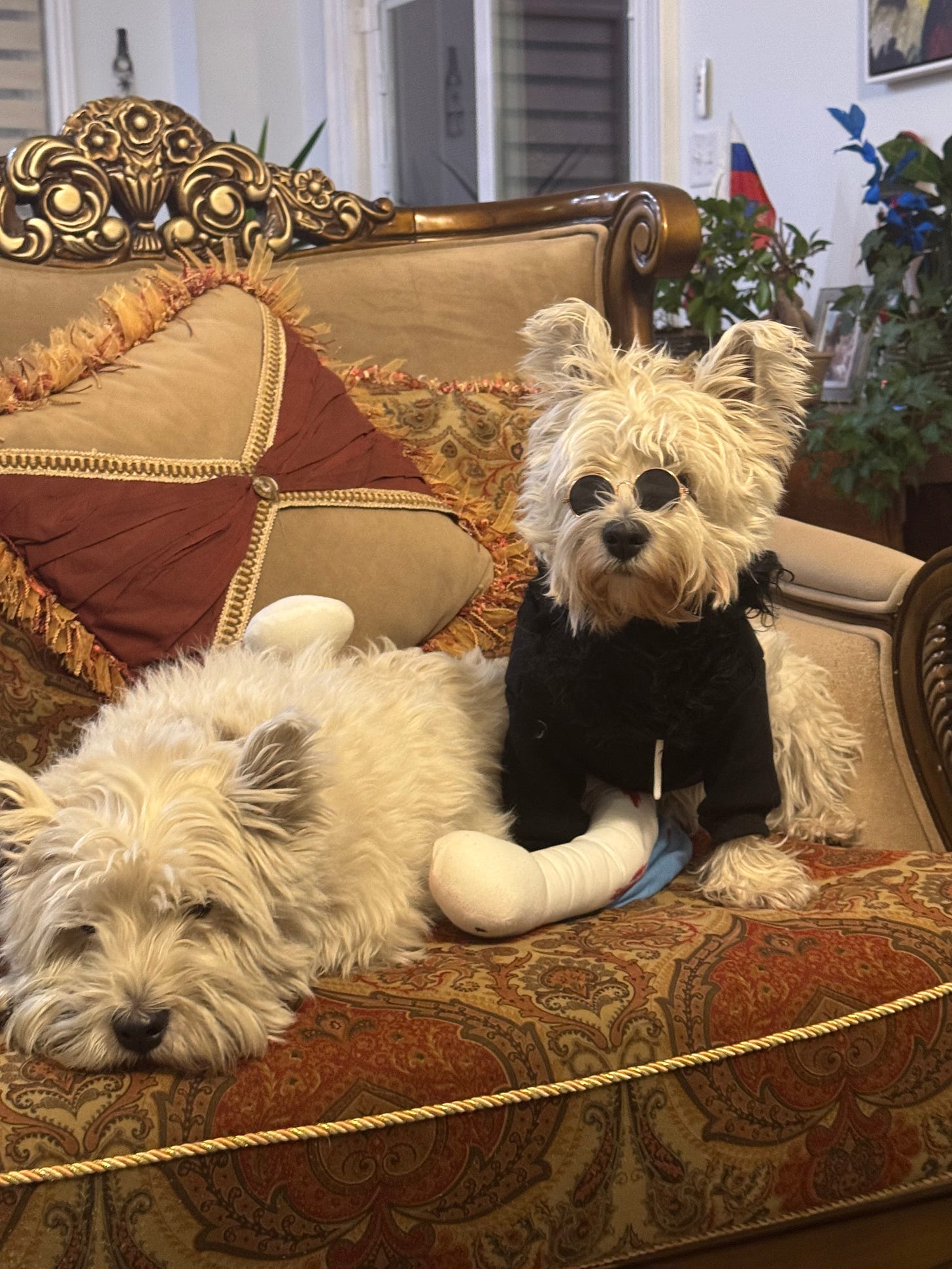
Tough times! So glad you lived to tell the tale.
I laughed loud and long at the Irish parts. Thank you. You’re talented- it was right after feeling bad for your whole family.